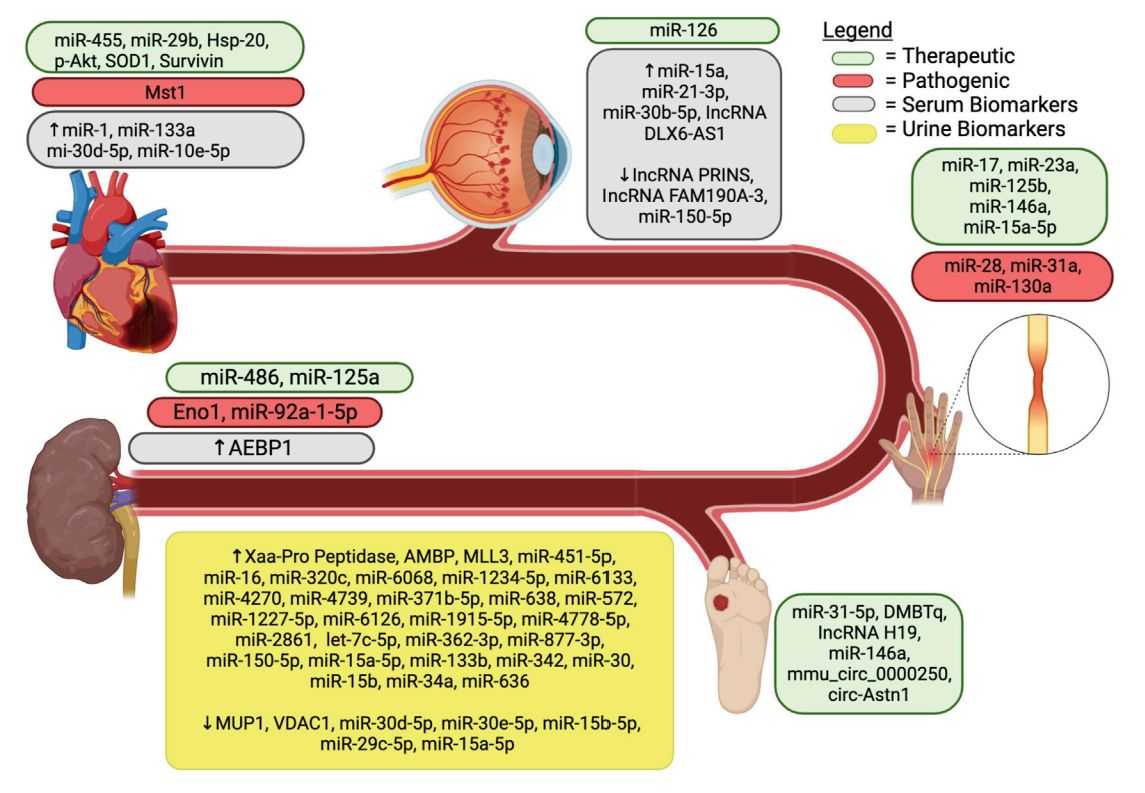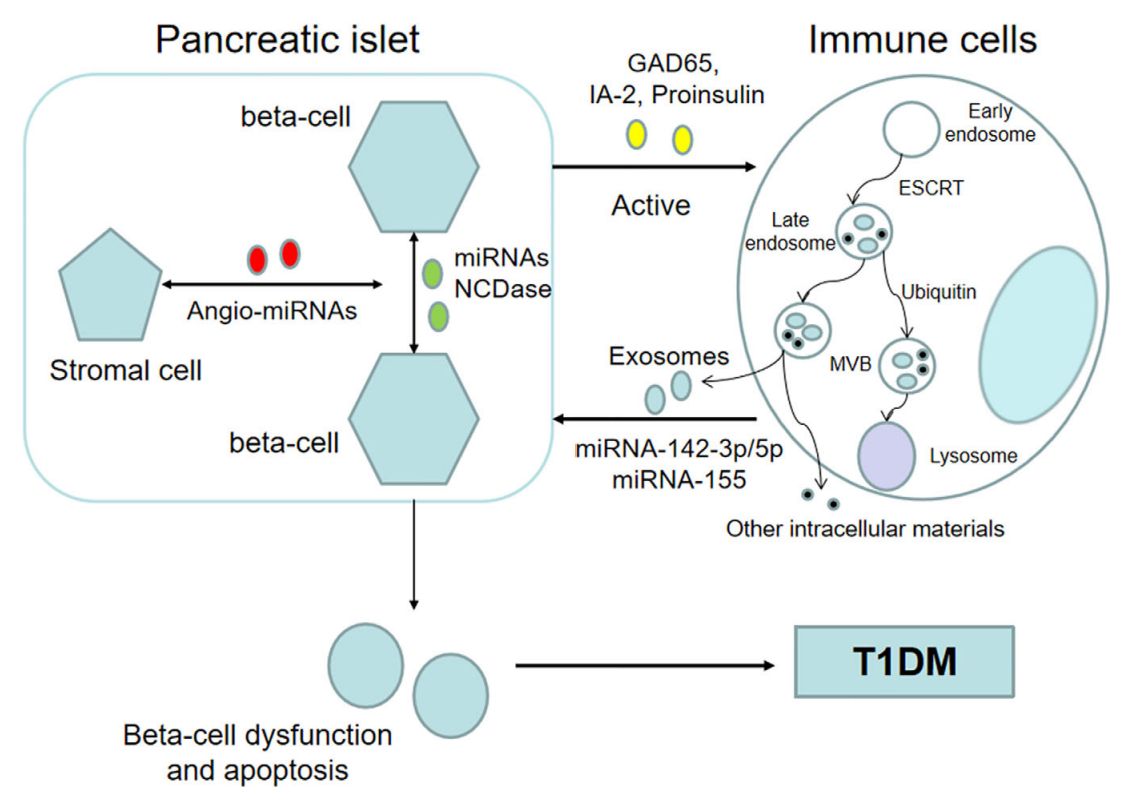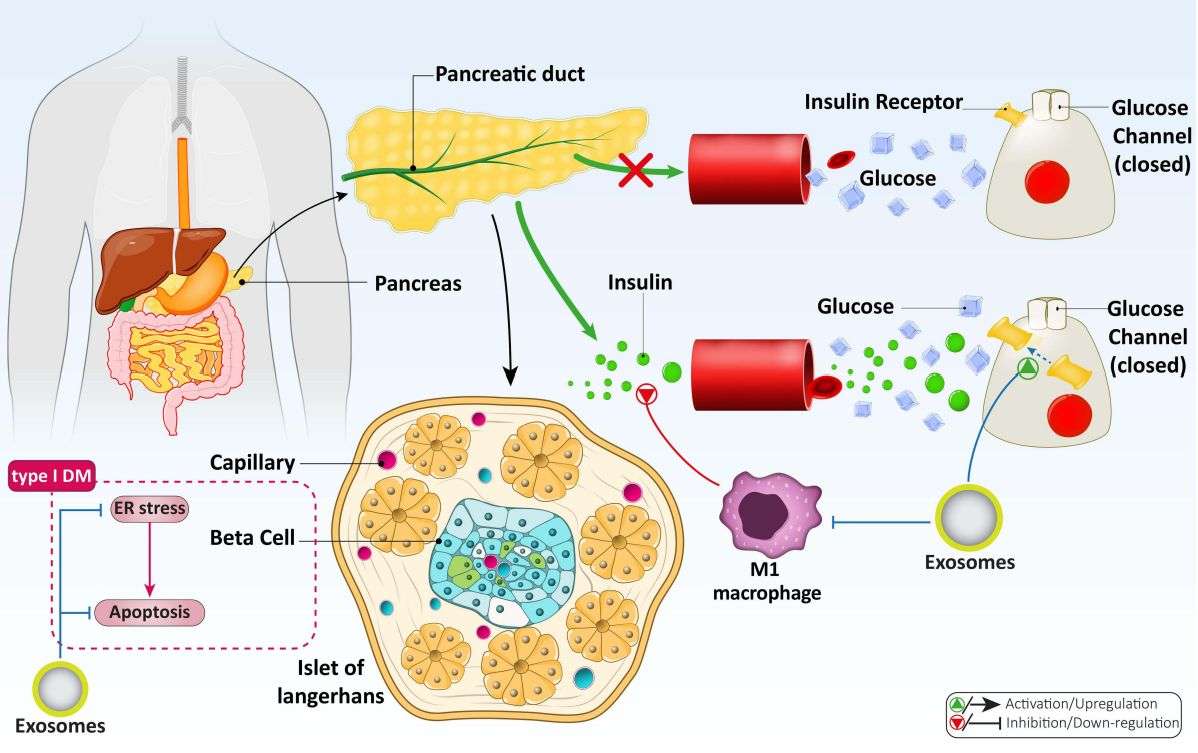Exosome Research in Human Diabetes
Diabetes mellitus (DM) is a common chronic metabolic disorder in clinical practice, which is significantly characterized by elevated blood glucose due to insufficient insulin secretion or insulin resistance. Prolonged hyperglycemia can cause damage to a variety of tissues such as eyes, kidneys, heart, blood vessels, and nerves. When the disease is serious, it can cause many complications.
However, the current clinical treatments for DM are limited, so there is an urgent need to find more effective targets to treat DM and its complications. In recent years, the research of exosomes in DM has been in full swing. On the one hand, exosomes can provide new biomarkers for the early diagnosis of DM. On the other hand, molecular dissection of the pathways initiated by exosomes under metabolic stress conditions can help to provide a deeper understanding of the pathophysiology of DM and its related metabolic diseases, which can lead to the development of new therapeutic programs.
 Figure 1. Exosomes are involved in the progression of diabetes and its complications. (Satyadev N, et al., 2023)
Figure 1. Exosomes are involved in the progression of diabetes and its complications. (Satyadev N, et al., 2023)
How are Exosomes Involved in DM Progression?
Exosomes are membrane vesicles 30-150 nm in diameter that mediate signaling between cells by delivering RNA, proteins, and DNA. During DM, exosomes are taken up by recipient cells and perform biological functions, thereby regulating the progression of DM-related complications.
 Figure 2. Exosomes are involved in the pathology of type 1 diabetes mellitus. (Pang H, et al., 2020)
Figure 2. Exosomes are involved in the pathology of type 1 diabetes mellitus. (Pang H, et al., 2020)
- Exosomes Influence Insulin Secretion
Exosomes in DM regulate pancreatic β-cells through intercellular signaling. It has been found that the release of exosomal miRNAs derived from pancreatic β-cells in DM is influenced by blood glucose, which regulates the activity of pancreatic β-cells.
- Exosomes Increase Inflammation
Inflammatory factors are key contributors to the development of DM. Exosomes are involved in the DM inflammatory response process, e.g., adipose tissue-derived exosomes can transfer to monocytes in the peripheral blood and differentiate into activated macrophages. Macrophages produce the pro-inflammatory factors TNF-α and interleukin (IL-6), which promote the inflammatory response.
- Exosomes Promote Vascular Injury
Vascular endothelial cell dysfunction is the main pathological feature of DM. Exosomes regulate DM endothelial cell function through intercellular communication. Under hyperglycemic conditions, blood exosomes induce endothelial dysfunction and promote vascular injury.
- Exosomes Promote Complications
Exosomes are capable of functioning in organs and circulation throughout the body. Exosomes in DM patients may cause organ damage and fibrosis, promoting heart disease, kidney disease, bone fracture, and eye disease.
Exosome Research in DM Therapy
Exosomes deliver bioactive molecules between cells and produce significant biological effects on target cells, providing a theoretical basis for developing novel DM therapeutic approaches.
Exosomes as a therapeutic vehicle have the following advantages:
- Exosomes isolated from the patient's blood are immunocompatible.
- Exosomes can cross the blood-brain barrier due to their structural characteristics and have higher histocompatibility.
- Exosomes have functions similar to those of the source cells, e.g. exosomes released from mesenchymal stem cells have immunomodulatory effects similar to those of the donor cells and can induce tissue regeneration.
 Figure 3. The potential of exosomes in diabetes treatment. (Ashrafizadeh M, et al., 2022)
Figure 3. The potential of exosomes in diabetes treatment. (Ashrafizadeh M, et al., 2022)
- Exosomes Improve Glucose Tolerance, Insulin Sensitivity
Exosomes derived from human umbilical cord mesenchymal stem cells injected intravenously into the tail vein of a rat model of T2DM can improve glucose tolerance and insulin sensitivity. Exosomes miR-106b-5p and miR-222-3p can participate in bone marrow transplantation-induced β-cell regeneration, and intravenous injection of the corresponding miRNAs can promote the proliferation of β-cells after injury and improve hyperglycemia in insulin-deficient DM patients. In addition, it is found that exosomes have significant efficacy in improving pancreatic islet function and hepatic glucose and lipid metabolism in DM patients, and the patients achieve glucose reduction after treatment.
- Exosomes Promote Repair and Regeneration of Damaged Pancreatic β-Cells
The lack of pancreatic β-cell function causes insufficient insulin secretion or insulin resistance, which leads to elevated blood glucose and DM. Exosome therapy, with its strong self-renewal ability and multidirectional differentiation potential, has become the best method to obtain a large number of pancreatic β-cells. By transplanting exosomes into DM patients, the patients can restore the repair and regeneration ability of the body, repair the damaged pancreatic islet tissues and pancreatic β-cells in the body, and promote insulin secretion, to achieve the clinical cure of DM and its complications.
| Cat No. | Product Name | Source |
| Exo-HDBF-10 | HQExo™ Exosome-SDH-Diabetes plasma | Exosome derived from Single Donor Human Diabetes plasma |
| EV-H-030 | Single Donor Human Diabetes Plasma Exosome | / |
| Explore All Exosomes Isolated from Human Diabetes Plasma | ||
Exosomal miRNA and DM
miRNAs secreted by exosomes can be transferred to neighboring cells, exposing the parent cell to pathophysiological circumstances common to DM and affecting the survival of recipient cells. This novel mechanism of intercellular communication regulates pancreatic islet β-cell activity. Studies have shown that exosomes secreted by the pancreas contain miR-375, which regulates insulin secretion as well as islet formation. Lack of miR-375 is associated with hyperglycemia. In addition, miR-27a-3p, miR-27b-3p, and miR-192, which are associated with poor glucose tolerance, miR-122, which is associated with disease progression, and let-7a and let-7f, which reflect glycemic control and response to medication, etc., these exosomal miRNAs play a key role in glucose-lipid metabolism regulation and can be promising biomarkers for DM.
Summary
The stable circulation of exosomes in body fluids and the consistency with the course of the responding disease provide the basis for the use of exosomes as biomarkers of DM and its complications. In addition, compared to cell therapy, exosome therapy is more effective, easier to store and manage, with fewer transplant safety concerns and lower immune rejection, providing for the development of new therapeutic applications.
Creative Biostructure has professional knowledge of exosome research and high-quality exosome products, provides advanced exosome isolation and characterization technology, and helps clients develop exosome-based DM diagnostic and therapeutic approaches. Feel free to contact us for more information.
References
- Satyadev N, et al. Exosomes as biomarkers and therapy in type 2 diabetes mellitus and associated complications. Front Physiol. 2023. 14: 1241096.
- Pang H, et al. Emerging Roles of Exosomes in T1DM. Front Immunol. 2020. 11: 593348.
- Ashrafizadeh M, et al. Exosomes as Promising Nanostructures in Diabetes Mellitus: From Insulin Sensitivity to Ameliorating Diabetic Complications. Int J Nanomedicine. 2022. 17: 1229-1253.